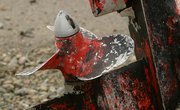Many deer antlers are too curved to be used as-is for knife handles, but you can straighten them so that they can accept the tang of a blade. Once you've straightened an antler, you can prepare and attach it to a knife blade without needing adhesives.
Items you will need
Stock pot
Sandpaper
Tongs
Reciprocating saw
Vise clamp
Full tang knife blade
Straightening a Horn Section
Measure the length of antler that you'll use for the knife handle. It should be at least 1 to 2 inches longer than the tang of the blade and should be sufficient to fit in your hand with overlap on both sides of the palm. Mark the antler section.
Cut the antler section with your reciprocating saw. Sand down any rough edges.
Soak the antler section in cold water for 24 to 48 hours. This will begin the softening process that will allow you to straighten the antler.
Boil water in your stock pot. Remove the antler section from the cold water that it has been soaking in and place it in the boiling water. Let it boil for 15 to 20 minutes.
Use tongs to remove the antler from the boiling water and place it into a vise clamp. Position the antler so that the curve is between the jaws of the clamp, and close the clamp just enough that it puts pressure onto the antler. This must be done quickly; clamp the antler within 30 seconds of removing it from the boiling water.
Wait until the antler has dried completely to remove it from the clamp. The antler will have permanently straightened.
Making the Horn into a Knife Handle
Place the straightened antler into a container of cool water and allow it to soak.
Check the antler core's softness every three days by pressing it with your fingernail. Allow the antler to soak until you can make an obvious indentation in the core; this can take a month or more.
Cut or file the tang of the knife blade slightly so that it ends in a wedge shape. This will help it to penetrate the antler core. Wrap the blade in cloth and secure it in your vise clamp so that the tang faces up.
Push the antler down onto the tang, using your body weight to slide it down to the base of the blade; go slowly, forcing the tang could damage the antler.
Place the knife in a well-ventilated area where the handle can dry completely. As the antler dries, it will grip to the tang, keeping the blade in place.
Warnings
- Wear leather gloves when inserting the tang of the blade into the antler to protect your hands from cuts.
Tips
- Affix padding to the jaws of your vise grip in order to cushion your antler section when straightening it Adding sorrell leaves, vinegar, soured milk or buttermilk to the cold water soak when straightening your antler can make the softening progress go more quickly.
References
- PrimitiveWays.com: "Making an Antler Handle Knife"
- MacGregor, Arthur: "Bone, Antler, Ivory and Horn" pp. 63-65
Tips
- Affix padding to the jaws of your vise grip in order to cushion your antler section when straightening it Adding sorrell leaves, vinegar, soured milk or buttermilk to the cold water soak when straightening your antler can make the softening progress go more quickly.
Warnings
- Wear leather gloves when inserting the tang of the blade into the antler to protect your hands from cuts.
Writer Bio
Born in West Virginia, Jack Gerard now lives in Kentucky. A writer and editor with more than 10 years of experience, he has written both articles and poetry for publication in magazines and online. A former nationally ranked sport fencer, Gerard also spent several years as a fencing coach and trainer.



